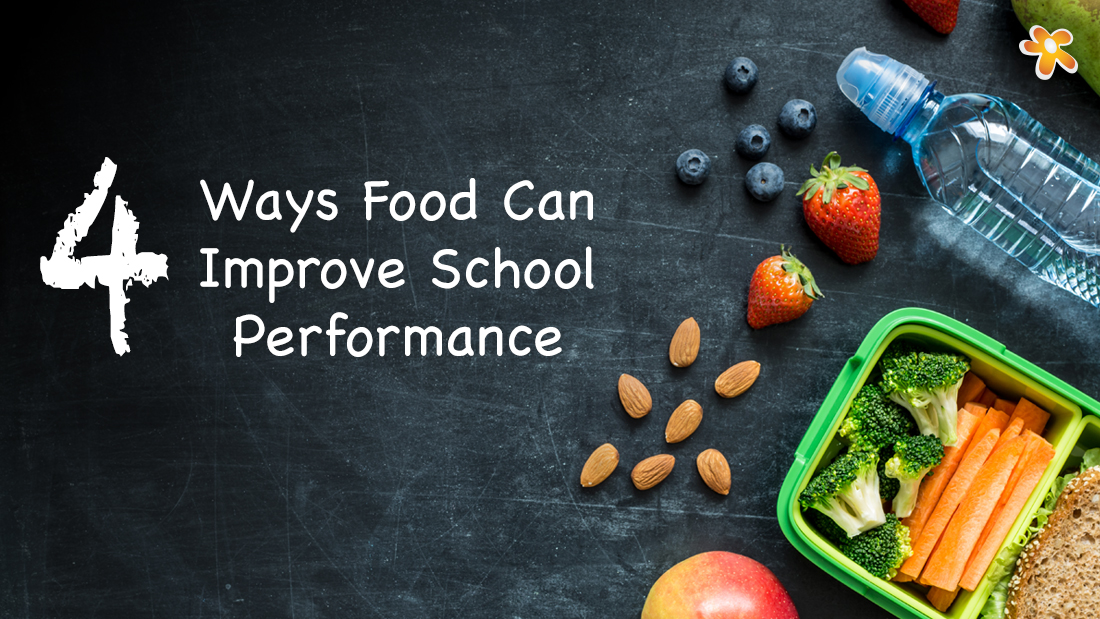Four Ways Food Can Improve School Performance
Start with a Quick, Hearty Breakfast Mornings can be a rush with everyone trying to get ready and out the door on time. Starting the day with a filling breakfast that you can whip up quickly will provide your children with the energy they need to focus on learning first thing in the school day. Keep a bin of quick oats in the pantry for a quick breakfast that will warm their tummies. Heat water in the microwave for a couple minutes, then pour over the oats until covered. Once the oats absorb the hot water, just add a little salt, a spoonful of butter, and a bit of maple syrup for a tasty bowl. The fiber in the oats and the fat in the butter slow digestion so their bellies remain full longer. If your family likes to make brunch on the weekends, plan to make some extra to freeze for weekday breakfasts. Waffles and pancakes freeze great and easily pop into the toaster to heat for a weekday breakfast. Use whole wheat or white whole wheat flour to increase fiber for staying power. The butter/oil and eggs in these breakfast staples help to maintain your children’s energy until the next time they eat. Another brunch favorite, breakfast burritos, are simple to freeze as well. Fill the tortillas with eggs, meat, cheese, potatoes, or whatever favorite fillings you have on hand. Roll up the tortillas and wrap each in foil before putting them in the freezer. Thaw the burritos overnight in the fridge, then they just need a few minutes in the toaster oven or microwave (don’t forget to take off the foil) to heat up. Breakfast Boosters:
- Quick oats with butter and maple syrup
- Made-ahead pancakes or waffles, heated up in the toaster – made-ahead breakfast burritos
Send a Balanced Lunch
Just like at breakfast your children need a balanced lunch to help them push through their afternoon fatigue. Aim to provide four or five different food groups in their lunch. Starches such as bread and crackers give them quick energy and are fun to eat. Proteins such as lunch meat, nut butters and cheese give them lasting energy to tackle the afternoon. Providing foods with a little fat such as salad dressings, mayonnaise or hummus help to slow digestion to stave off hunger. Pack both a fruit and a vegetable to give your children some fiber and vitamins. Even if you have a picky eater who tends to refuse vegetables or doesn’t like meat, provide something from each of the groups anyway. It is still your child’s choice whether he eats them, but each exposure gets you one step closer to acceptance. It can take some cautious children up to twenty exposures to a specific food before they come around to liking it. Get your children on board by allowing them to help choose which food within each group they would like in their lunch. For example, let them choose between carrot sticks with Ranch, broccoli florets with hummus or lettuce for their vegetable. Balanced Lunch:
- Nut/seed-butter and honey sandwich with carrots and Ranch and mandarin oranges
- Tortilla roll-up with turkey, spinach and cheese, and apple slices and popcorn
- Hard-boiled egg, banana nut muffin, shredded carrots, and grapes
Be Ready After School with a Snack to Refuel
Most children are hungry as soon as they walk through the door after school. They are also probably tired and out of sorts from a long day of learning and socializing. Be prepared with a snack that will reenergize them and help them focus on their homework. Just like breakfast and lunch, a balanced snack is best for helping them focus on the next task. Aim for a snack that combines starch and protein, plus maybe some fruit. Set out hummus or cottage cheese with crackers and grapes or orange slices. Or toast a bagel half with pizza sauce and cheese in the toaster oven for a mini pizza. Serve it with apple slices or strawberries. Invite everyone to sit at the table to relax while they fuel up. Sit with them so you can enjoy each other’s company and talk about everyone’s day. Even if you’re not hungry for a snack, just taking the time to check in will help your children begin to settle and focus. Snack Fuel:
- Hummus with crackers and orange slices
- Half pizza bagel toasted in the toaster oven and strawberries
- Greek yogurt with granola and blueberries
Fine-tune the Number of Treats at School
Many classrooms have frequent treats to celebrate birthdays, holidays and other milestones. Treats are a tasty way to celebrate and share a moment with friends, but they can prevent children from being able to focus in school. The quick energy many children feel after having a sugary treat or drink makes it hard for them to focus on learning. Soon after the high, many children feel their energy plummet and their thinking becoming fuzzy. This is a normal reaction to simple sugars, but makes learning difficult. Talk to your children’s teachers or the school administrators about limiting the number of sugary treats allowed to the rare special occasion. There are many tasty alternatives for celebrations in classrooms, including gummies or ice pops made from fruit juice, fruits on kabobs or cut into fun shapes, and popcorn or fun-shaped crackers in individual cups. Suggest to teachers alternative celebration ideas, including pajama day, extra outside time or watching a short show. Alternative School Celebrations:
- Fun-shaped crackers served in mini cups
- Gummies or ice pops made from fruit juice
- Fresh fruit on kabobs or cut in fun shapes
- Crazy hair day, extra outside time, watch a short show
Slow Changes for Lasting Success
Making changes to routine can be overwhelming and you may get some push-back from your children when they notice different foods in their lunches. Pick one change to make at a time so it all doesn’t seem too strange. Maybe this week you’ll start with having a sit-down snack after school. Next week you might start offering a vegetable in their lunch. Stick to your intentions and let your children choose foods within the structure you provide them so everyone feels comfortable. After a while you’ll begin to see improvements in concentration and focus that will make everyone feel accomplished.
We Can Help
If you feel stuck trying to come up with meal and snack ideas or if you find yourself battling with your children over what foods they’re eating, we’re here to help you with nutrition counseling services at Carolina Pediatric Therapy. We can also help you plan meals around a food allergy or intolerance and make sure your child is getting all the nutrition they need to learn. Call us today at 828.398.0043.
Four Ways Food Can Improve School Performance
Andra Sylvanus, MS, RD, LDN
Want to know how a Therapist can Help?
Call (828) 398 0043 or click on the schedule button.



